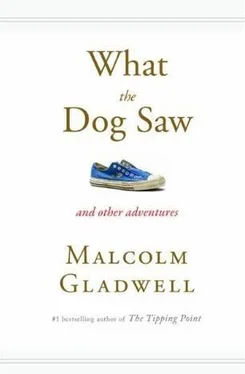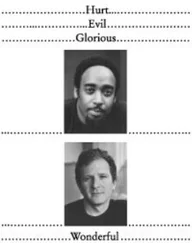As the day came to an end, Taleb and his team turned their attention once again to the problem of the square root of n. Taleb was back at the whiteboard. Spitznagel was looking on. Pallop was idly peeling a banana. Outside, the sun was beginning to settle behind the trees. “You do a conversion to p1 and p 2,” Taleb said. His marker was once again squeaking across the whiteboard. “We say we have a Gaussian distribution, and you have the market switching from a low-volume regime to a high-volume. P 21. P22. You have your igon value.” He frowned and stared at his handiwork. The markets were now closed. Empirica had lost money, which meant that somewhere off in the woods of Connecticut Niederhoffer had no doubt made money. That hurt, but if you steeled yourself and thought about the problem at hand, and kept in mind that someday the market would do something utterly unexpected because in the world we live in something utterly unexpected always happens, then the hurt was not so bad. Taleb eyed his equations on the whiteboard and arched an eyebrow. It was a very difficult problem. “Where is Dr. Wu? Should we call in Dr. Wu?”
A year after Nassim Taleb came to visit him, Victor Niederhoffer blew up. He sold a very large number of options on the S &P index, taking millions of dollars from other traders in exchange for promising to buy a basket of stocks from them at current prices, if the market ever fell. It was an unhedged bet, or what was called on Wall Street a naked put, meaning that he bet everyone on one outcome: he bet in favor of the large probability of making a small amount of money, and against the small probability of losing a large amount of money—and he lost. On October 27, 1997, the market plummeted 8 percent, and all of the many, many people who had bought those options from Niederhoffer came calling all at once, demanding that he buy back their stocks at pre-crash prices. He ran through $130,000,000—his cash reserves, his savings, his other stocks—and when his broker came and asked for still more, he didn’t have it. In a day, one of the most successful hedge funds in America was wiped out. Niederhoffer had to shut down his firm. He had to mortgage his house. He had to borrow money from his children. He had to call Sotheby’s and sell his prized silver collection—the massive nineteenth-century Brazilian “sculptural group of victory” made for the Visconde De Figueirdeo, the massive silver bowl designed in 1887 by Tiffany & Co. for the James Gordon Bennett Cup yacht race, and on and on. He stayed away from the auction. He couldn’t bear to watch.
“It was one of the worst things that has ever happened to me in my life, right up there with the death of those closest to me,” Niederhoffer said recently. It was a Saturday in March, and he was in the library of his enormous house. Two weary-looking dogs wandered in and out. He is a tall man, an athlete, thick through the upper body and trunk, with a long, imposing face and baleful, hooded eyes. He was shoeless. One collar on his shirt was twisted inward, and he looked away as he talked. “I let down my friends. I lost my business. I was a major money manager. Now I pretty much have had to start from ground zero.” He paused. “Five years have passed. The beaver builds a dam. The river washes it away, so he tries to build a better foundation, and I think I have. But I’m always mindful of the possibility of more failures.” In the distance, there was a knock on the door. It was a man named Milton Bond, an artist who had come to present Niederhoffer with a painting he had done of Moby Dick ramming the Pequod. It was in the folk-art style that Niederhoffer likes so much, and he went to meet Bond in the foyer, kneeling down in front of the painting as Bond unwrapped it. Niederhoffer has other paintings of the Pequod in his house, and paintings of the Essex, the ship on which Melville’s story was based. In his office, on a prominent wall, is a painting of the Titanic. They were, he said, his way of staying humble. “One of the reasons I’ve paid lots of attention to the Essex is that it turns out that the captain of the Essex, as soon as he got back to Nantucket, was given another job,” Niederhoffer said. “They thought he did a good job in getting back after the ship was rammed. The captain was asked, ‘How could people give you another ship?’ And he said, ‘I guess on the theory that lightning doesn’t strike twice.’ It was a fairly random thing. But then he was given the other ship, and that one foundered, too. Got stuck in the ice. At that time, he was a lost man. He wouldn’t even let them save him. They had to forcibly remove him from the ship. He spent the rest of his life as a janitor in Nantucket. He became what on Wall Street they call a ghost.” Niederhoffer was back in his study now, his lanky body stretched out, his feet up on the table, his eyes a little rheumy. “You see? I can’t afford to fail a second time. Then I’ll be a total washout. That’s the significance of the Pequod.”
A month or so before Niederhoffer blew up, Taleb had dinner with him at a restaurant in Westport, and Niederhoffer told him that he had been selling naked puts. You can imagine the two of them across the table from each other, Niederhoffer explaining that his bet was an acceptable risk, that the odds of the market going down so heavily that he would be wiped out were minuscule, and Taleb listening and shaking his head, and thinking about black swans. “I was depressed when I left him,” Taleb said. “Here is a guy who goes out and hits a thousand backhands. He plays chess like his life depends on it. Here is a guy who, whatever he wants to do when he wakes up in the morning, he ends up doing better than anyone else. Whatever he wakes up in the morning and decides to do, he did better than anyone else. I was talking to my hero…” This was the reason Taleb didn’t want to be Niederhoffer when Niederhoffer was at his height—the reason he didn’t want the silver and the house and the tennis matches with George Soros. He could see all too clearly where it all might end up. In his mind’s eye, he could envision Niederhoffer borrowing money from his children, and selling off his silver, and talking in a hollow voice about letting down his friends, and Taleb did not know if he had the strength to live with that possibility. Unlike Niederhoffer, Taleb never thought he was invincible. You couldn’t if you had watched your homeland blow up, and had been the one person in a hundred thousand who gets throat cancer, and so for Taleb there was never any alternative to the painful process of insuring himself against catastrophe.
This kind of caution does not seem heroic, of course. It seems like the joyless prudence of the accountant and the Sunday school teacher. The truth is that we are drawn to the Niederhoffers of this world because we are all, at heart, like Niederhoffer: we associate the willingness to risk great failure—and the ability to climb back from catastrophe—with courage. But in this we are wrong. That is the lesson of Taleb and Niederhoffer, and also the lesson of our volatile times. There is more courage and heroism in defying the human impulse, in taking the purposeful and painful steps to prepare for the unimaginable.
In the fall of 2001, Niederhoffer sold a large number of options, betting that the markets would be quiet, and they were, until out of nowhere two planes crashed into the World Trade Center. “I was exposed. It was nip and tuck.” Niederhoffer shook his head, because there was no way to have anticipated September 11. “That was a totally unexpected event.” [2] Sometimes the gap between hearing an idea and figuring out how to write about it is substantial. In this case, it was almost a decade. While he was in medical school, my friend Chris Grover once pointed out to me that, from an evolutionary perspective, the experience of modern women was profoundly unusual. Up until the beginning of the nineteenth century, women of childbearing age rarely menstruated. Today, they menstruate all the time. I found that fascinating. But how on earth do you fashion a story around that fact? Then I discovered John Rock.
Читать дальше











